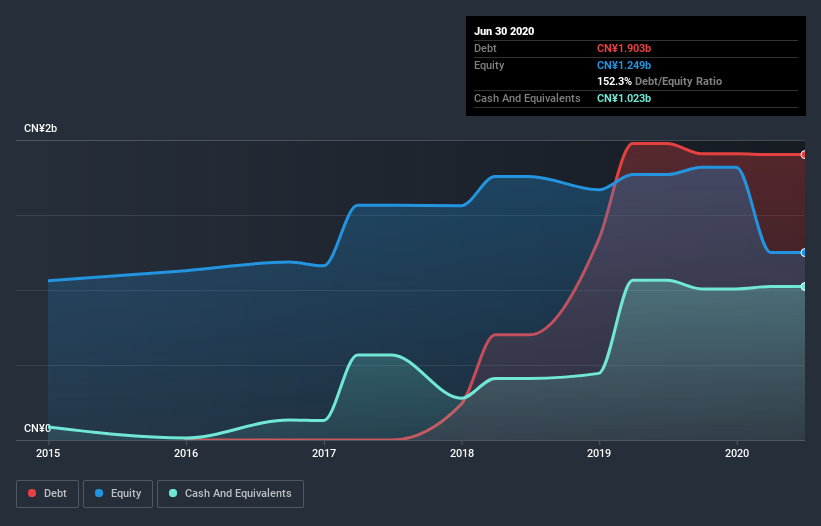- Hong Kong
- /
- Healthcare Services
- /
- SEHK:3869
Hospital Corporation of China (HKG:3869) Takes On Some Risk With Its Use Of Debt

Warren Buffett famously said, 'Volatility is far from synonymous with risk.' It's only natural to consider a company's balance sheet when you examine how risky it is, since debt is often involved when a business collapses. We can see that Hospital Corporation of China Limited (HKG:3869) does use debt in its business. But the real question is whether this debt is making the company risky.
What Risk Does Debt Bring?
Debt is a tool to help businesses grow, but if a business is incapable of paying off its lenders, then it exists at their mercy. Part and parcel of capitalism is the process of 'creative destruction' where failed businesses are mercilessly liquidated by their bankers. However, a more common (but still painful) scenario is that it has to raise new equity capital at a low price, thus permanently diluting shareholders. Of course, debt can be an important tool in businesses, particularly capital heavy businesses. The first step when considering a company's debt levels is to consider its cash and debt together.
See our latest analysis for Hospital Corporation of China
How Much Debt Does Hospital Corporation of China Carry?
The chart below, which you can click on for greater detail, shows that Hospital Corporation of China had CN¥1.90b in debt in June 2020; about the same as the year before. On the flip side, it has CN¥1.02b in cash leading to net debt of about CN¥879.9m.

How Healthy Is Hospital Corporation of China's Balance Sheet?
The latest balance sheet data shows that Hospital Corporation of China had liabilities of CN¥925.9m due within a year, and liabilities of CN¥1.65b falling due after that. Offsetting this, it had CN¥1.02b in cash and CN¥308.6m in receivables that were due within 12 months. So its liabilities total CN¥1.25b more than the combination of its cash and short-term receivables.
This deficit is considerable relative to its market capitalization of CN¥1.29b, so it does suggest shareholders should keep an eye on Hospital Corporation of China's use of debt. Should its lenders demand that it shore up the balance sheet, shareholders would likely face severe dilution.
We use two main ratios to inform us about debt levels relative to earnings. The first is net debt divided by earnings before interest, tax, depreciation, and amortization (EBITDA), while the second is how many times its earnings before interest and tax (EBIT) covers its interest expense (or its interest cover, for short). Thus we consider debt relative to earnings both with and without depreciation and amortization expenses.
Hospital Corporation of China has a debt to EBITDA ratio of 4.8, which signals significant debt, but is still pretty reasonable for most types of business. But its EBIT was about 59.4 times its interest expense, implying the company isn't really paying a high cost to maintain that level of debt. Even were the low cost to prove unsustainable, that is a good sign. Unfortunately, Hospital Corporation of China's EBIT flopped 12% over the last four quarters. If earnings continue to decline at that rate then handling the debt will be more difficult than taking three children under 5 to a fancy pants restaurant. There's no doubt that we learn most about debt from the balance sheet. But you can't view debt in total isolation; since Hospital Corporation of China will need earnings to service that debt. So if you're keen to discover more about its earnings, it might be worth checking out this graph of its long term earnings trend.
Finally, while the tax-man may adore accounting profits, lenders only accept cold hard cash. So we clearly need to look at whether that EBIT is leading to corresponding free cash flow. Over the most recent three years, Hospital Corporation of China recorded free cash flow worth 55% of its EBIT, which is around normal, given free cash flow excludes interest and tax. This cold hard cash means it can reduce its debt when it wants to.
Our View
Hospital Corporation of China's net debt to EBITDA and EBIT growth rate definitely weigh on it, in our esteem. But the good news is it seems to be able to cover its interest expense with its EBIT with ease. We should also note that Healthcare industry companies like Hospital Corporation of China commonly do use debt without problems. Taking the abovementioned factors together we do think Hospital Corporation of China's debt poses some risks to the business. While that debt can boost returns, we think the company has enough leverage now. The balance sheet is clearly the area to focus on when you are analysing debt. However, not all investment risk resides within the balance sheet - far from it. For instance, we've identified 1 warning sign for Hospital Corporation of China that you should be aware of.
If you're interested in investing in businesses that can grow profits without the burden of debt, then check out this free list of growing businesses that have net cash on the balance sheet.
When trading Hospital Corporation of China or any other investment, use the platform considered by many to be the Professional's Gateway to the Worlds Market, Interactive Brokers. You get the lowest-cost* trading on stocks, options, futures, forex, bonds and funds worldwide from a single integrated account. Promoted
If you're looking to trade Hospital Corporation of China, open an account with the lowest-cost platform trusted by professionals, Interactive Brokers.
With clients in over 200 countries and territories, and access to 160 markets, IBKR lets you trade stocks, options, futures, forex, bonds and funds from a single integrated account.
Enjoy no hidden fees, no account minimums, and FX conversion rates as low as 0.03%, far better than what most brokers offer.
Sponsored ContentValuation is complex, but we're here to simplify it.
Discover if Hospital Corporation of China might be undervalued or overvalued with our detailed analysis, featuring fair value estimates, potential risks, dividends, insider trades, and its financial condition.
Access Free AnalysisThis article by Simply Wall St is general in nature. It does not constitute a recommendation to buy or sell any stock, and does not take account of your objectives, or your financial situation. We aim to bring you long-term focused analysis driven by fundamental data. Note that our analysis may not factor in the latest price-sensitive company announcements or qualitative material. Simply Wall St has no position in any stocks mentioned.
*Interactive Brokers Rated Lowest Cost Broker by StockBrokers.com Annual Online Review 2020
Have feedback on this article? Concerned about the content? Get in touch with us directly. Alternatively, email editorial-team@simplywallst.com.
About SEHK:3869
Hospital Corporation of China
An investment holding company, operates and manages hospitals in the People’s Republic of China.
Good value with worrying balance sheet.
Market Insights
Community Narratives



